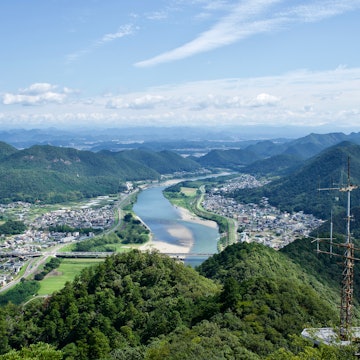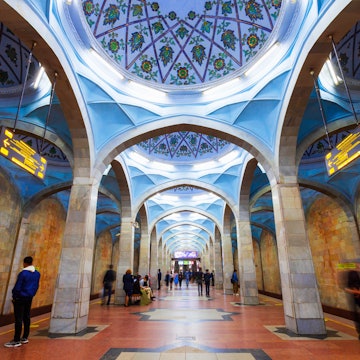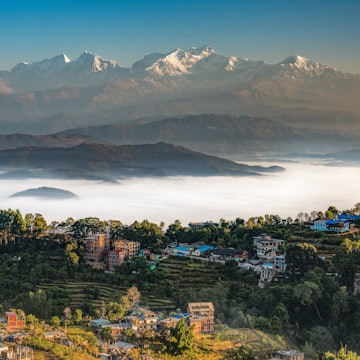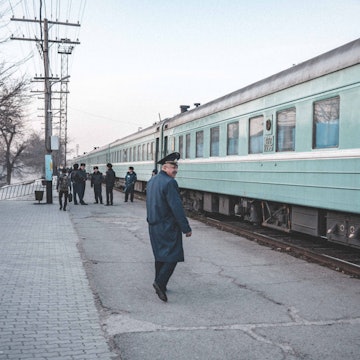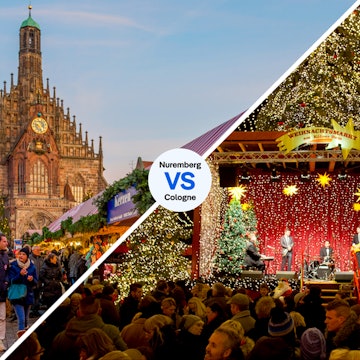

Spring flowers in bloom in Wùyuán. chinaface/Getty Images
A multifaceted gem, there is no one special time to visit China. This vast country relaxes to the pace of warm lapping island waves in a southern pocket while swarming with workers in heavy coats in the east. Yet most visitors will find the ideal periods to visit are spring (April to May) and autumn (September to October). The landscapes are at their most enticing while comfortable temperatures (10°C/50°F to 23°C/73°F) are handy for outdoor activities and manageable crowds. In peak summer, daytime highs can reach 40°C (104°F) while central (Hénán, Húběi and Húnán) and southern China (including Yúnnán, Sìchuān and Guǎngzhōu) swelter with high humidity. Luckily, summer overflows with cultural festivals that celebrate long into the evening when temperatures cool off.
The most famous celebration, Chinese New Year is not a time of public events or festivals. For at least the first three days (of a seven-day public holiday in late January or early February), cities come to a standstill as businesses close and residents return to their hometowns to play cards or mahjong and share meals. The country experiences the world's largest human migration and travel during this time is difficult and nearly impossible without prebooking transport.
Pick the best time for your visit to China with this seasonal guide to the weather, crowds and most fascinating festivals.

March to May is full of pleasant afternoons and cherry blossoms
Sunshine finally flickers across China in spring after a long winter, but it's still the low season. Temperatures range from 10°C to 25°C (50°F to 77°F), making it ideal for outdoor activities and sightseeing. The mild days make for easy clambering along the Great Wall of China in Beijing without breaking a sweat, though the dust storms of March can get in the way. Meanwhile the smaller crowds at the Terracotta Army in Xi'an give plenty of breathing room.
Cherry blossoms puff into life in parks and temples in Shēnzhèn, Wǔhàn and Beijing in March, reaching China's northernmost province Harbin (Hā’ěrbīn) by late April. Shanghai explodes with blossoms from over 10,000 trees in Gucun Park during Shanghai Cherry Blossom Festival.
South of the Yangtze River, the cities of Sūzhōu, Hángzhōu, and Yángzhōu come alive with flourishing gardens and charming water towns. In Wùyuán, fields of rapeseed delight photographers with their happy yellow hue.
If you prefer something more active, jump into the mid-April water-splashing activities of Dai New Year in Jǐnghóng City, Yúnnán province. Don't even bother trying to stay dry; instead cleanse away the dirt, demons and sorrows of the old year.
Want more adventure? In May, the Great Wall Marathon is the most hardcore of physical tests with a "fun run" or full marathon along 5164 stone steps of the Tianjin section of the Great Wall.
The most colorful April festival takes place in Dali, in the north of Yunnan, at the spectacular Third Moon Fair where the Bai ethnic minority sing and dance, congregate at a street bazaar, and perform traditional horse and archery competitions to celebrate Guanyin, the Chinese Buddhist goddess of mercy.
The season closes with Buddha's birthday in May. The Tibetan charms of Xiahe are visible when Buddhist monks show their most charitable sides to beggars and the streets buzz with pilgrims.

June to August is best for hot festivals and time on the beach
Summer in China cranks up the heat. Dramatically, the cities of Chongqing, Nanjing and Wuhan are dubbed the Three Furnaces for their soaring temperatures, while summer rain can break across Guangdong, Guangxi and Hainan. Despite the heat, this season is packed with vibrant festivals and events to enjoy the longer daylight hours.
The Dragon Boat Festival in late May or early June takes over the waterways of southern China. Hángzhōu, subtropical Guangzhou, Hong Kong and Yueyang hold raucous boat races. For many locals, it's all just an excuse to eat zongzi, traditional sticky rice wrapped in reed leaves.
In Tibet in June, the Dharma Festival in Gyantse celebrates athleticism across three days of wrestling, archery and yak races, while the Tagong Horse Festival showcases Tibetan horsemanship with impressive displays on a hilltop overlooking Tagong's two monasteries and surrounding mountain peaks.
Matching the drama, in July the Bai and Yi minorities of Dali celebrate the Torch Festival by parading flaming torches through the streets and fields at night. There are plenty of photo ops. Just to be sure to vacate the southern areas in July when typhoons lash the Guangdong and Fujian coastlines. Instead, duck to Dalian International Beer Festival for 12 days of beer tasting from tents showing off over 400 international and Chinese beers. In August, it's Shāndōng's turn with the Qingdao International Beer Festival in a former German concession town, home of the famous Tsingtao-brand beer.
To escape the heat, locals hop to the beautiful sandy beaches of Sānyà on Hǎinán Island for refreshing sea breezes during the peak heat of June. You can also try the rainy but mild Guìzhōu – it's the best time to see Huángguǒshù Falls when the water flow is at its most powerful.

September and October brings fresh days to Beijing and colorful foliage
September is the best time to visit Beijing and northern China. Afternoons are warm (26°C/78°F) or cloudy but bookended by cool and dry mornings and evenings. If you want to head outdoors to the Forbidden City and Summer Palace or go for nature walks, this is the most comfortable time, especially with dwindling tourist crowds. Just watch out for the Mid-Autumn Festival (usually in late September) and the National Day Holiday (first week of October), which heave with crowds of domestic travelers.
In September, Guìlín has just enough rainfall and water volume for a cruise on the Li River to witness the jagged-peak limestone karsts. The Longji Rice Terraces are also at their most photogenic as they turn from lush green to golden, ready for harvest and billowing in the autumn breeze.
Hundreds of trail runners and mountain bikers race up the slopes of the sacred Tai Shan for the International Mount Tai Climbing Festival in September.
By late October, beautiful fall leaves paint the mountains of Jiuzhaigou National Park, Sìchuān, in crimson. Not to be outdone, Huángshān (the Yellow Mountains) lives up to its golden name with stunning rock formations shrouded in mist and autumn colors. The Miao minority sing in their New Year with rice wine and ethnic festivities in Guìzhōu, the minority-rich heartland of China.
In the center of the Tibetan Buddhist world, Lhasa, the landscapes turn vibrant with fall colors, and it's a good time for trekking and exploring Potala Palace in the dry, sunny weather.

November to March is best for budget travelers and winter activities
Winter starts to bite across China, with temperatures dropping below freezing in the north in December. It's a great season for unique experiences and is perfect for budget travelers. Tourist attractions are less crowded, and prices for flights and accommodations are significantly lower.
Wintery magic shines at the Harbin Ice and Snow Festival in the city of Harbin beside the iced-over Songhua River. The world’s biggest ice sculpture festival shows off dozens of ice-formed buildings and giant sculptures hewn from ice and snow.
Locals show off their best ski moves and outfits at ski resorts in Yabuli in Hēilóngjiāng province and Chángbái Shān in Jílín province, or they flee the cold to warmer Hainan Island for China's best surfing.
If you do end up in China during Chinese New Year, stay put and enjoy the highlight for visitors, the Spring Lantern Festival, held on the last day of the festivities. Nanjing Qinhuai International Lantern Festival takes it to the next level with paper palaces and dragons lit up at night.
The Monlam Great Prayer Festival takes place in the first month of the Tibetan calendar, anywhere between December and February. Grand prayer ceremonies are held and a huge silk thangka (sacred art) is ceremoniously unveiled on a hillside for public worship.










